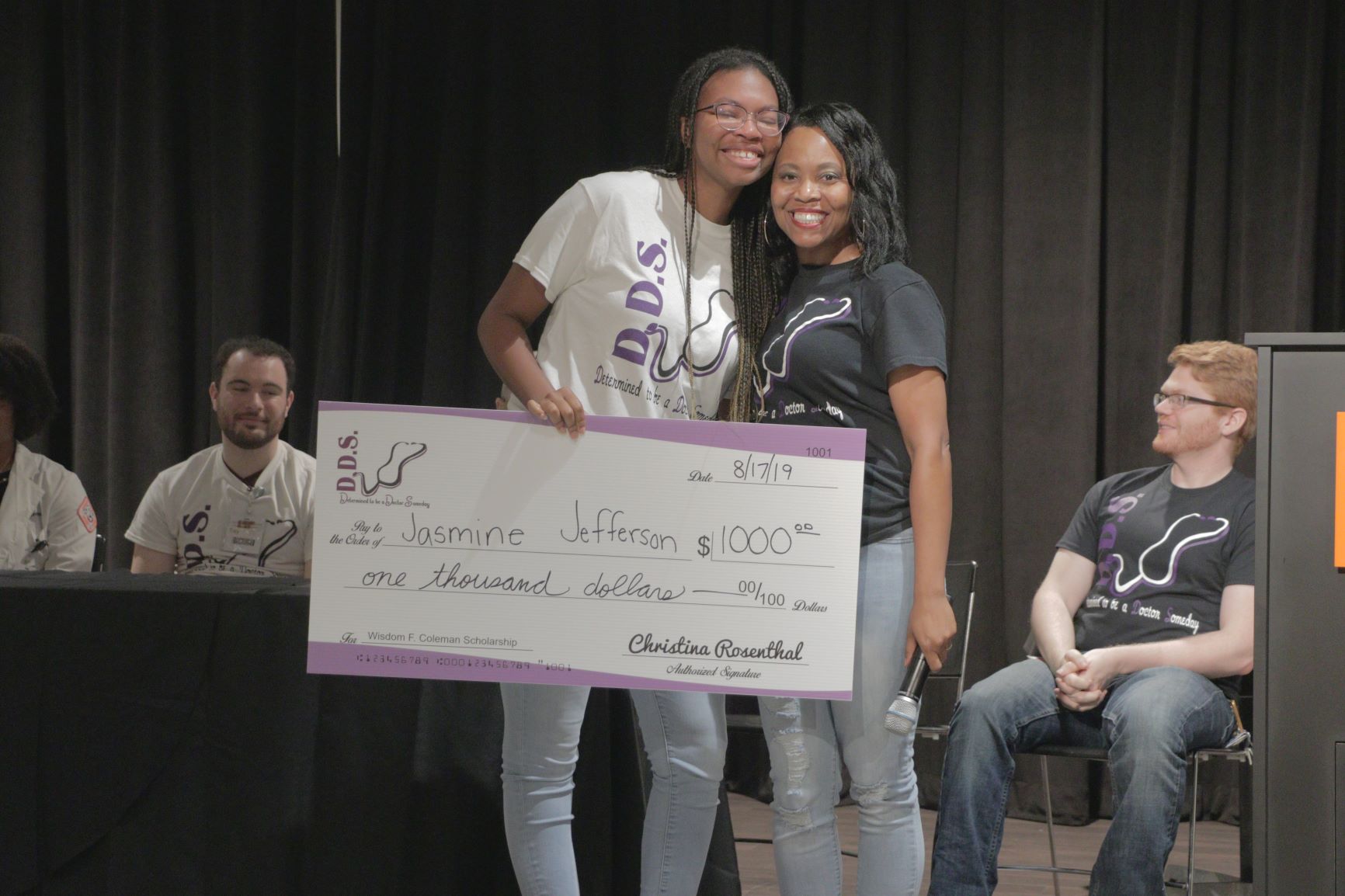
The path to medical school began in high school for Memphis native Jasmine Jefferson, when she met a woman who would become her mentor, her cheerleader, and soon, her colleague in health care.
Jefferson, a third-year student in the UT Health Science Center’s College of Medicine, was considering a future in medicine or engineering in high school. But Christina Rosenthal, a Memphis dentist, UTHSC alumna, and founder of Determined to be a Doctor Someday (DDS), a mentoring program for high school-age minority and underrepresented students, tipped the scales in favor of a career in medicine.
Jefferson, 24, says the DDS program exposed her to the possibility of a career in health care in a way she had not been before.
“It definitely helped provide a support system,” she says. “During the program, we had a lot of different speakers come in and talk to us about their experiences in the health care field and about becoming a doctor. And then we also had some activities that were geared toward medicine. We had one activity where we learned how to suture, which was really cool.”
She recalls walking on the UTHSC campus in Memphis for the first time.
“We were actually on the campus learning about medicine from people who were prominent figures in the medical field.”
And she remembers that Dr. Rosenthal, herself a product of great mentors, continued to encourage her during high school, through college at Vanderbilt University, and into medical school.
“Even after the program, she has kept in touch with us,” Jefferson says.

Dr. Rosenthal knows from personal experience how important such encouragement and direction is in helping guide young minority and underrepresented students toward health care. She was born in North Memphis in an area that she describes as inner city and poor. She grew up in a single-parent home where money was scarce.
The mentors in her life, including the principal who encouraged her to study, family friends who helped care for her, and her church family, guided her along the way. She eventually graduated magna cum laude from the University of Memphis and went on to graduate from the UTHSC College of Dentistry in 2005. Now a wife and mother of three sons, she owns Paradigm Dental Center near the Hickory Hill area of Memphis.
In 2011, Dr. Rosenthal, with the help of UTHSC, created DDS to introduce promising minority and underrepresented students to opportunities for careers in health care. She was participating in the American Dental Association’s Institute for Diversity in Leadership and had to create a project to benefit the community in order to complete the program. DDS, an annual, six-month educational and mentoring program for youths ages 14-18, has evolved since then, always with a focus on increasing the number of minorities in health care. Some of Dr. Rosenthal’s early participants, including Jefferson, now are making their way through professional school in various health care fields, and moving toward graduation.
“This was something that I’ve always wanted to do,” Dr. Rosenthal says. “Once I started it, it has just been such a passion, one that I didn’t realize was so embedded within me, to see other people become successful.”

As the numbers of students have grown, she realizes it is time to begin moving from anecdotal measures of success to metrics in order to plot the program’s impact.
“Now we’re trying to really beef up our tracking and data because we have students who are becoming professionals,” she says. “I never could have imagined it would have lasted this long. But I’m so grateful that the circumstances allowed me to create it and to keep it ongoing.”
Always mindful of the “angels” who have guided her own path, Dr. Rosenthal credits UTHSC with helping her program become established and grow. The university has supported DDS, offered locations for its annual summer symposium, experts to talk to the students, and financial support. Executive Vice Chancellor and Chief Operations Officer Ken Brown, JD, MPA, PhD, FACHE, has been a champion of DDS. He has spoken at many symposiums that bring the students to campus, and in August during the 2020 symposium held virtually, he gave the welcoming address on what to know when applying to professional schools.
“It has been an honor and privilege to be associated with and a champion for Dr. Rosenthal and DDS,” Dr. Brown says. “Dr. Rosenthal possesses an unparalleled passion and enthusiasm for the success of the young people of our community, and UTHSC shares her commitment.”
Delta Dental of Tennessee’s President and CEO Philip Wenk, DDS, (UTHSC ’77), chair of the UTHSC Advisory Board, has been a supporter of the program since he read about Dr. Rosenthal several years ago. Delta Dental of Tennessee has contributed to the program from its philanthropic arm, the Smile 180 Foundation, to help support the symposiums and aid in planning of future DDS programs.
“From the second you meet Dr. Rosenthal, you are inspired. She is truly opening doors for young people and helping them find paths that enable them to pursue—and succeed in—health care-related fields,” Dr. Wenk says. “While there are a lot of programs that support STEM learning opportunities, Dr. Rosenthal shares her experience and shows high school students how they can turn their dreams into realities.”
Dr. Rosenthal is keenly focused on helping her students achieve to affect a larger issue, the low numbers of minorities in health care and the impact that has on health outcomes.

“I think the practitioners that we see should be reflective of the population,” she says. “And research has proven that people like to go to people that mirror them, that mirror their culture, where they can feel a level of comfort. And I just think, in order to best serve Americans, we need to have doctors, including African American doctors, that can be representative of the population.”
While Jefferson comes from economic and social circumstances different than Dr. Rosenthal’s, she agrees with the urgency of finding ways to help minority and underrepresented students find their way to medical school and other health-care professional schools.
“I think it (the lower numbers for minorities in health care) is probably due to the fact that there are not a lot of Black physicians to begin with,” Jefferson says. “They (students) seem not to think that they can actually go that far, like they could even reach that potential, because they don’t see that many Black faces.”
DDS, she says, opened her mind to all the possibilities available to her and connected her to people in the community she could see as role models.
And for that, she has a personal message for Dr. Rosenthal: “I would say just thank you for continuing to support me throughout all the years and believing in me.”
This story was first published in the Winter 2021 issue of Our Tennessee magazine.
